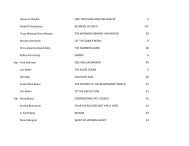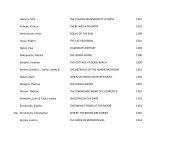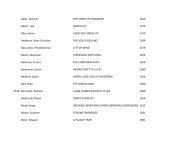nonfiction
nonfiction
nonfiction
You also want an ePaper? Increase the reach of your titles
YUMPU automatically turns print PDFs into web optimized ePapers that Google loves.
“An astute testimony of a<br />
regime grown intractably dastardly.”<br />
from expelled<br />
Deposit Insurance Corporation and the Office of Thrift Supervision,<br />
sometimes-warring U.S. government agencies, as their top<br />
executives argued whether WaMu could be saved. During that<br />
debate, Jamie Dimon, chief executive at JPMorgan Chase, agreed<br />
to purchase the diminishing nontoxic assets of WaMu.<br />
A detailed, instructive account of a bank failure far<br />
away from the power centers of New York City.<br />
BETTER, STRONGER, FASTER<br />
The Myth of American<br />
Decline..and the Rise<br />
of a New Economy<br />
Gross, Daniel<br />
Free Press (256 pp.)<br />
$26.00 | May 8, 2012<br />
978-1-4516-2128-0<br />
Yahoo! Finance columnist and editor<br />
Gross (Dumb Money: How Our Greatest<br />
Financial Minds Bankrupted the Nation, 2009,<br />
etc.) confidently asserts that America is not in a terminal decline.<br />
The author insists, against the naysayers, that the financial<br />
rescue of 2009 actually worked. The private sector is restructuring,<br />
the government has acted promptly and effectively, foreign investments<br />
are still a factor and the country’s exports are in demand<br />
around the world. To back his seemingly irrepressible optimism, he<br />
provides plenty of evidence, often from his own travels and interviews.<br />
Whether discussing “BigBelly,” an innovative solar-powered<br />
trash compactor, or Wallquest, an international exporter of luxury<br />
wallpapers, or GE’s thriving, export-driven, South Carolina–based<br />
turbine production, the author is on the case. Gross writes that<br />
proponents of decline believe that “all the structural forces transforming<br />
the global economy are arrayed against us. But that’s not<br />
true.” Unlike those who see China as a threat, the author examines<br />
the transformation of America’s relationship with China, as U.S.<br />
companies manufacture for consumption there. GM now produces<br />
more vehicles there than it does here, and KFC boasts that<br />
it is the “largest and fastest growing restaurant chain in mainland<br />
China today.” Within the U.S., Gross highlights the development<br />
of the Bakken oil fields in North Dakota and looks at the international<br />
role of higher education in America, along with the internationalization<br />
of U.S. book publishing. The author recognizes that<br />
his claims are not set in stone and can turn out differently, but he<br />
does so without abandoning his underlying optimism. He is confident<br />
outsourced jobs will soon begin to flow back into the U.S., and<br />
he promotes investment in domestic infrastructure.<br />
An upbeat account full of useful information.<br />
MUD, SWEAT, AND TEARS<br />
The Autobiography<br />
Grylls, Bear<br />
Morrow/HarperCollins (416 pp.)<br />
$26.99 | May 1, 2012<br />
978-0-06-212419-7<br />
978-0-06-212414-2 e-book<br />
The fearless host of Man vs. Wild<br />
illustrates a highly spirited life.<br />
Born in Britain in 1974, Edward Michael<br />
Grylls (his sister nicknamed him “Bear,”<br />
and it stuck) became heavily influenced by the strength and<br />
resilience of his great-grandfather, a British officer during<br />
World War I. His childhood memories include nervously anticipating<br />
school grades and thriving amid the tireless support (but<br />
limited attention) of two hardworking parents who urged him<br />
to “follow your dreams and to look after your friends and family<br />
along the way.” With unflagging confidence, Grylls (To My Sons:<br />
Lessons for the Wild Adventure Called Life, 2012, etc.) satisfied his<br />
adventurous side as a youth with frequent harrowing adventures<br />
with his father, a Royal Marine, and developed physical stamina<br />
in karate class, which tempered bouts of mischief. Grylls’ narrative<br />
is bolstered by its heavily anecdotal form. The author’s<br />
finely detailed account of a grueling, physically challenging stint<br />
in the Special Air Services becomes surprisingly overshadowed<br />
by the book’s centerpiece: the author’s arduous, three-month<br />
group expedition at 23 to the crest of Mount Everest. Utilizing<br />
skills polished in the British Army, he became one of the youngest<br />
mountaineers to reach that summit, which begat lectures,<br />
a deodorant commercial, appointment as the youngest ever<br />
Chief Scout to the Scouting Association and eventual celebrity<br />
status as an influential personality on the Discovery Channel<br />
(Man vs. Wild receives only a few cursory, concluding chapters).<br />
Grylls’ breezy account flows with the verve and uncomplicated<br />
language of an engaging novel and forms a satisfying life story<br />
brimming with excitement and adventuresome risk-taking.<br />
An inside look at the makings of an intrepid, insatiable<br />
explorer. (Three 8-page color photo inserts. Author tour to Denver,<br />
Los Angeles, New York, Portland, San Francisco, Seattle)<br />
THE FATE OF THE SPECIES<br />
Why the Human Race<br />
May Cause Its Own Extinction<br />
and How We Can Stop It<br />
Guterl, Fred<br />
Bloomsbury (224 pp.)<br />
$25.00 | Jun. 1, 2012<br />
978-1-60819-258-8<br />
A fine scientific explanation of our<br />
abuse of the natural world that, despite the<br />
subtitle, does not explain how to stop it.<br />
Scientific American executive editor Guterl begins by discussing<br />
mass extinction, a process that has occurred half-a-dozen<br />
times over life’s 2.5-billion-year history, eliminating up to 90<br />
percent of species. The survivors thrived, and the current mass<br />
extinction (already in progress) may not eliminate the human<br />
species, but the consequences will be dismal. With frequent<br />
detours into discussions of terrorism, the author describes the<br />
science behind a dozen potential disasters provoked by a combination<br />
of sheer human numbers and technological advances.<br />
Deadly plagues are inevitable as microbes jump back and forth<br />
between animals and humans; if these natural mutations don’t<br />
produce a superbug, genetic engineering (perhaps by a clever<br />
terrorist) might do the same. Guterl portrays global warming,<br />
now under way, with vivid specifics on rising sea levels, melting<br />
ice caps, vanishing fresh water and increasingly unstable<br />
weather. Widespread famine predicted by doomsayers isn’t yet<br />
happening, but food prices are rising. The obligatory hopeful<br />
finale mentions eliminating carbon-based fuels, doing without<br />
energy-consuming conveniences and living in harmony with<br />
nature—though the author admits these measures are unlikely<br />
to be undertaken. Dramatic advances in genetically engineered<br />
plants and animals, atmospheric coolants, small-scale local,<br />
energy-efficient agriculture and massive carbon-sequestration<br />
will work when they arrive—but none have arrived yet.<br />
Aside from too many lurid terrorist scenarios, this is<br />
an intelligent account of the mess we are making of the<br />
planet; the unsettling conclusion: that humans may survive<br />
because we are resilient, not because we can fix matters.<br />
EXPELLED<br />
A Journalist’s<br />
Descent into the<br />
Russian Mafia State<br />
Harding, Luke<br />
Palgrave Macmillan (320 pp.)<br />
$27.00 | May 22, 2012<br />
978-0-230-34174-6<br />
The Guardian’s former Moscow<br />
bureau chief provides a firsthand account<br />
of the kleptocratic spy state that is Vladimir<br />
Putin’s Russia.<br />
Prior to his posting in Moscow in 2007, British journalist<br />
Harding was stationed in Berlin; in a final, chilling chapter of<br />
this delineation of the pernicious post-Soviet security system,<br />
he compares what he experienced with the spying and terror<br />
routinely practiced by the former East Germany Stasi. Soon<br />
after the author arrived in Moscow, the flat where he lived with<br />
his wife and children was broken into, the window left open<br />
and objects subtlety moved. This sneaky psychological exercise<br />
would be repeated over the four years Harding managed to stick<br />
it out, especially after he and his newspaper had revealed embarrassing<br />
information about the corruption and repression practiced<br />
by the Putin regime. The author knew the identities of the<br />
“ghosts” who broke into his flat, bugged his phone and routinely<br />
followed him, because he was summoned to Lefortovo prison<br />
for interrogation by Russia’s Federal Security Service, the successor<br />
to the KGB where Putin cut his teeth. Deemed an enemy<br />
of the state, Harding was also in a unique position to observe up<br />
close the machinations of Putin’s paranoid, anti-Western Russia,<br />
run by siloviki, or “power guys” intent on protecting their<br />
interests at all costs and repressing any opposition. The author<br />
was on the frontlines of coverage of the Georgian insurrection<br />
in 2008, the Chechen terrorist attacks in the Moscow metro of<br />
2010 and the rise of anti-ethnic thuggery. He proves a keen, sensitive<br />
chronicler of the growing chasm between Russia’s haves<br />
and have-nots.<br />
An astute testimony of a regime grown intractably dastardly.<br />
LIFE EVERLASTING<br />
The Animal Way of Death<br />
Heinrich, Bernd<br />
Houghton Mifflin Harcourt (256 pp.)<br />
$25.00 | Jun. 19, 2012<br />
978-0-547-75266-2<br />
Heinrich (Biology Emeritus/Univ. of<br />
Vermont; The Nesting Season: Cuckoos, Cuckolds<br />
and the Invention of Monogamy, 2010,<br />
etc.) explores the taboos and relevance of<br />
scavengers, the “life-giving links that keep<br />
nature’s systems humming along smoothly.”<br />
After a friend asked if he could be buried on the author’s<br />
woodland property in Maine, he reexamined his curiosity with<br />
the natural world: watching burying beetles for hours, sawing<br />
through a log to track the progress of beetle larvae, tracking<br />
and feeding local ravens. Heinrich presents five major sections<br />
outlining how bodies and plants are recycled and broken down:<br />
small to large (beetles to raptors and ravens to humans, the ultimate<br />
recyclers), north to south (ravens to vultures and condors),<br />
plant undertakers (tree borers to dung beetles), watery deaths<br />
(salmon, whales and other marine species) and changes (metamorphosis<br />
and death rituals). Above all, temperature affects<br />
how and what breaks down carrion as the flies and insects of<br />
summer are replaced by various birds in the winter. The author<br />
also tracks how trees decompose, a process that often begins<br />
before they die. Heinrich’s main strength is his narration of the<br />
small stories—e.g., whale falls, dung beetles and ravens feeding.<br />
As a warning, he notes that extinctions have hit animal undertakers<br />
especially hard since vast herds of ungulates (deer, elk,<br />
bison) are no longer available. Heinrich maintains a conversational<br />
tone, but some of the chapters seem disparate, written<br />
at different times with different audiences in mind. Helpful<br />
author illustrations pepper the book.<br />
If you can’t spend an afternoon watching beetles and<br />
hearing Heinrich’s stories on how nature recycles its dead,<br />
this book is the next best thing.<br />
818 | 15 april 2012 | <strong>nonfiction</strong> | kirkusreviews.com |<br />
| kirkusreviews.com | <strong>nonfiction</strong> | 15 april 2012 | 819






